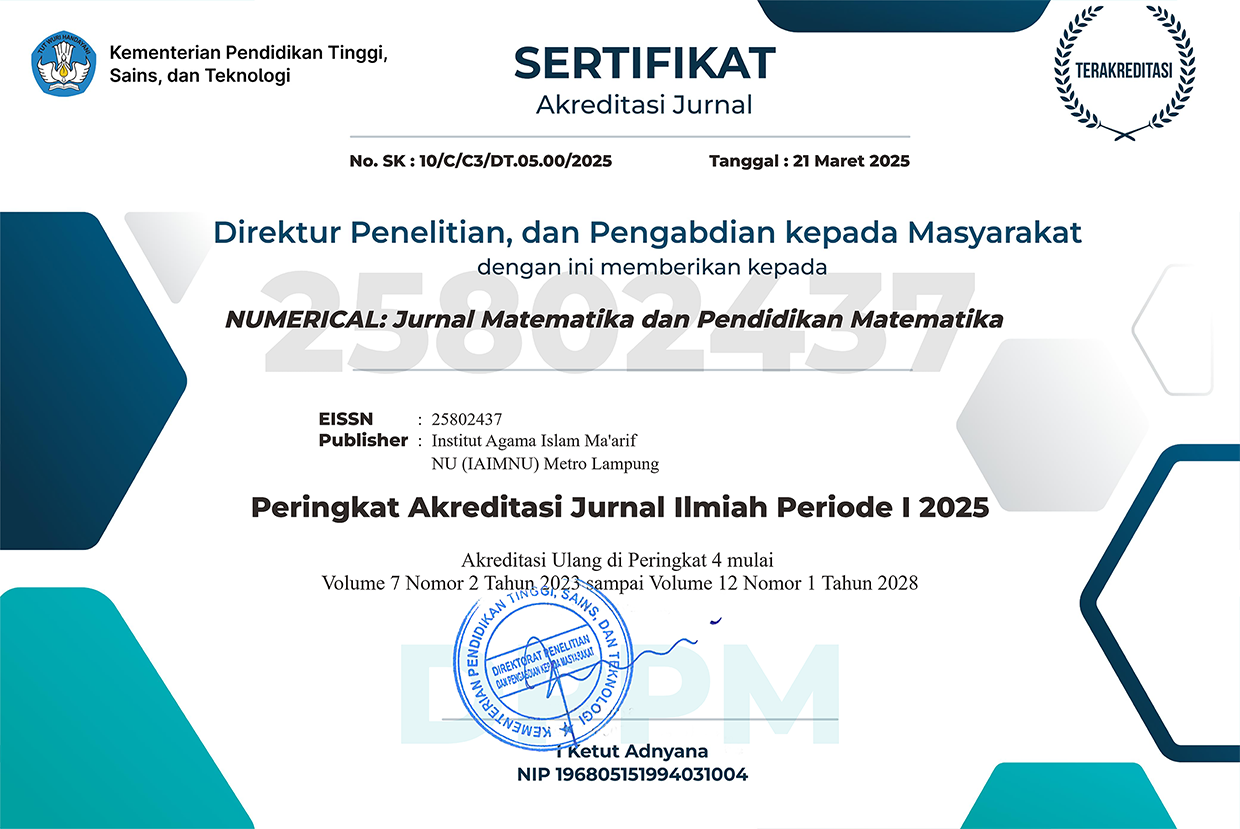Development of AKM-Based Mathematics Questions in the Adiwiyata Context to Train Students' Numeracy Skills
DOI:
https://doi.org/10.25217/numerical.v7i2.3729Keywords:
Adiwiyata, AKM, Mathematics Questions, Numeracy SkillAbstract
This study aims to produce AKM-based mathematics questions in the Adiwiyata context that are valid and practical and potentially affect the numeracy abilities of class X and XI MA students. The research method used is a development studies type design, which consists of two stages: the preliminary and formative evaluation. Data collection techniques used were walk-throughs, interviews, questionnaires and tests. The validity of the questions is obtained from the results of the validator's assessment in terms of content, construct, and language at the expert review stage and the clarity and readability of the questions based on students' comments and suggestions at the one-to-one stage. The practicality of the questions is obtained at the small group stage based on the questionnaire results. The potential effect of questions is obtained at the field test stage based on test and questionnaire results. This research produced 30 mathematics questions based on AKM contexts that were valid and practical and potentially affected numeracy abilities. The results of testing mathematics questions based on AKM in the Adiwiyata context showed that 44.87% of the 156 (26 students x 6 questions) analyzed answer items were identified as correct answers. As many as 44.23% of the 52 subjects (26 students x 2 questions) could solve knowing-level questions. As many as 48.7% of 78 subjects (26 students x 3 questions) could solve questions at the applying cognitive level, and 42.3% of 26 (26 students x 1 question) subjects could solve questions at the cognitive reasoning level.
References
Kemdikbud, “Hasil PISA Indonesia 2018: Akses Makin Meluas, saatnya Tingkatkan Kualitas.”
Tim Erlangga Fokus AKM SMA, Erlangga Fokus AKM SMA/MA. Jakarta: Penerbit Erlangga, 2020.
D. A. Rokhim et al., “Analisis Kesiapan Peserta Didik Dan Guru Pada Asesmen Nasional (Asesmen Kompetensi Minimum, Survey Karakter, Dan Survey Lingkungan Belajar,” Jurnal Administrasi dan Manajemen Pendidikan, vol. 4, no. 1, p. 61, Mar. 2021, doi: 10.17977/um027v4i12021p61. DOI: https://doi.org/10.17977/um027v4i12021p61
Direktorat Sekolah Dasar, “Inilah Jadwal dan Contoh Soal Asesmen Kompetensi Minimum (AKM),” Dikdas dan Dikmen Kementerian Pendidikan dan Kebudayaan, 2020.
D. Andiani, M. Nurhajizah, and J. A. Dahlan, “Analisis Rancangan Assesmen Kompetensi Minimum (AKM) Numerasi Program Merdeka Belajar,” Majamath : Jurnal Matematika dan Pendidikan Matematika, vol. 4, no. 1, pp. 80–90, Mar. 2020.
A. P. Kurniawan, M. T. Budiarto, and R. Ekawati, “Pengembangan Soal Numerasi Berbasis Konteks Nilai Budaya Primbon Jawa,” JRPM (Jurnal Review Pembelajaran Matematika), vol. 7, no. 1, pp. 20–34, Jun. 2022, doi: 10.15642/jrpm.2022.7.1.20-34. DOI: https://doi.org/10.15642/jrpm.2022.7.1.20-34
A. Winata, I. S. R. Widiyanti, and Sri Cacik, “Analisis Kemampuan Numerasi dalam Pengembangan Soal Asesmen Kemampuan Minimal pada Siswa Kelas XI SMA untuk Menyelesaikan Permasalahan Science,” Jurnal Educatio FKIP UNMA, vol. 7, no. 2, pp. 498–508, Jun. 2021, doi: 10.31949/educatio.v7i2.1090. DOI: https://doi.org/10.31949/educatio.v7i2.1090
R. A. Sani, Pembelajaran Berorientasi AKM : Asesmen Kompetensi Minimum. PT. Bumi Aksara, 2021.
Rosuli, Bedah AKM SMA. Matematika Nusantara Banten, 2021.
B. I. Permana and N. Ulfatin, “Budaya Sekolah Berwawasan Lingkungan pada Sekolah Adiwiyata Mandiri,” Ilmu Pendidikan: Jurnal Kajian Teori dan Praktik Kependidikan, vol. 3, no. 1, pp. 11–21, Oct. 2018, doi: 10.17977/um027v3i12018p011. DOI: https://doi.org/10.17977/um027v3i12018p011
F. Hidayatullah, “Implementasi Program Adiwiyata Melalui Kegiatan Lingkungan Berbasis Partisipatif di SMP N 1 Pandaan,” Inspirasi Manajemen Pendidikan, vol. 5, no. 1, 2017.
D. Haryadi and H. Widodo, “Pengembangan Kurikulum Berbasis Adiwiyata untuk Meningkatkan Kemampuan Practical Life,” Nidhomul Haq : Jurnal Manajemen Pendidikan Islam, vol. 5, no. 2, pp. 195–210, Aug. 2020, doi: 10.31538/ndh.v5i2.558. DOI: https://doi.org/10.31538/ndh.v5i2.558
I. K. Pradini, B. Sudjanto, and N. Nurjannah, “Implementasi Program Sekolah Adiwiyata Dalam Peningkatan Mutu Pendidikan di SDN Tanah Tinggi 3 Kota Tanggerang,” Jurnal Green Growth dan Manajemen Lingkungan, vol. 7, no. 2, pp. 122–132, Jan. 2019, doi: 10.21009/jgg.072.03. DOI: https://doi.org/10.21009/jgg.072.03
R. Rahmadiani, S. Utaya, and S. Bachri, “Ecological Literacy Siswa SMA Adiwiyata dan Non Adiwiyata,” Jurnal Pendidikan: Teori, Penelitian, dan Pengembangan, vol. 4, no. 4, p. 499, Apr. 2019, doi: 10.17977/jptpp.v4i4.12306. DOI: https://doi.org/10.17977/jptpp.v4i4.12306
T. Sulistiyoningsih, kartono Kartono, and mulyono Mulyono, “PBL Bernuansa Adiwiyata dengan Blended Learning untuk meningkatkan Kemampuan Pemecahan Masalah dan Karakter Peduli LIngkungan,” Unnes Journal of Mathematics Education Research, vol. 4, no. 2, pp. 84–92, 2015.
S. Nur Rohma, “Identifikasi tingkat berpikir kreatif peserta didik dalam memecahkan masalah Matematika berbasis Adiwiyata berdasarkan hasil belajar Matematika di atas KKM,” Surabaya: Universitas Negeri Sunan Ampel Surabaya, 2022.
A. H. Sanvi and H. A. Diana, “Analisis Kemampuan Numerasi Pada Materi Matriks Ditinjau Berdasarkan Kemampuan Awal Matematika,” Range: Jurnal Pendidikan Matematika, vol. 3, no. 2, pp. 129–145, Jan. 2022, doi: 10.32938/jpm.v3i2.2021. DOI: https://doi.org/10.32938/jpm.v3i2.2021
K. Indra and A. Rahadyan, “Analisis Kemampuan Numerasi Siswa Kelas XI dalam Penyelesaian Soal Tipe AKM pada Pokok Bahasan Sistem Persamaan Linear Tiga Variabel,” Didactical Mathematics, vol. 3, no. 2, pp. 84–91, Oct. 2021, doi: 10.31949/dm.v3i2.1810. DOI: https://doi.org/10.31949/dm.v3i2.1810
Zulkardi, Formatif Evaluation What, Why, When, and How. 2006. Accessed: Jul. 05, 2023. [Online]. Available: http://www.reoities.com/Zulkardi/books.html
R. Sundayana, Statistika penelitian pendidikan (pembahasan dilengkapi dengan bantuan MS excel dan SPSS). Bandung: Alfabet, 2014.
I. Istiqomah, “Sikap Peduli Lingkungan Peserta Didik di MAN-1 Pekanbaru Sebagai Sekolah Adiwiyata,” Dinamika Lingkungan Indonesia, vol. 6, no. 2, p. 95, Jul. 2019, doi: 10.31258/dli.6.2.p.95-103. DOI: https://doi.org/10.31258/dli.6.2.p.95-103
Downloads
Published
How to Cite
Issue
Section
License
Copyright (c) 2023 Taufiqoh Taufiqoh, Supratman Supratman, Khomsatun Ni’mah

This work is licensed under a Creative Commons Attribution-ShareAlike 4.0 International License.











